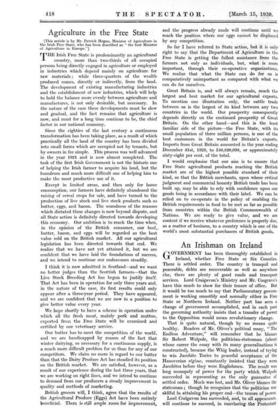Agriculture in the Free State
[This article is by Mr. Patrick Hogan, Minister of Agriculture in the Irish Free State, who has been described as " the best Minister of Agriculture in Europe."]
THE Irish Free State is predominantly an agricultural country, more than two-thirds of all occupied persons being directly engaged in agriculture or employed in industries which depend mainly on agriculture for raw materials ; while three-quarters of the wealth produced comes, directly or indirectly, from the land. The development of existing manufacturing industries and the establishment of new industries, which will help to hold the balance more evenly between agriculture and manufactures, is not only desirable, but necessary. In the nature of the case these developments must be slow and gradual, and the fact remains that agriculture is now, and must for a long time continue to be, the chief factor in our national economy.
Since the eighties of the last century a continuous transformation has been taking place, as a result of which practically all the land of the country has been divided into small farms which are occupied not by tenants, but by owners in fee simple. This process was well advanced in the year 1921 and is now almost completed. The task of the first Irish Government is not the historic one of helping the Irish farmer to acquire his land, but the humdrum and much more difficult one of helping him to make the most productive use of it.
Except in limited areas, and then only for home consumption, our farmers have definitely abandoned the raising of cereal crops for sale, and have turned to the production of live stock and live stock products such as butter, eggs, and bacon. The soundness of the reasons which dictated these changes is now beyond dispute, and all State action is definitely directed towards developing this economy. Our ambition is to reach the time when, in the opinion of the British consumer, our beef,., butter, bacon, and eggs will be regarded as the best value sold on the British market. All our agricultural legislation has been directed towards that end-.. .We realize that we have not yet attained it, but we are confident that we have laid the foundations of success, and we intend to continue our endeavours steadily.
I think it is now admitted in Scotland—and we want no better judges than the Scottish farmers—that the Live Stock Breeding Act has begun to justify itself. That Act has been in operation for only three years and, in the nature of the case, its first results could only appear after a three-year period. They have appeared, and we are confident that we are now in a position to give-better value every year.
We hope shortly to have a scheme in operation under which all the fresh meat, mainly pork and mutton, exported from. the Free state will be examined and certified by our veterinary service.
Our butter has to meet the competition of the world, and we are handicapped by reason of the fact that winter dairying, so necessary for a continuous supply, is a much more difficult problem for us than for any of our competitors. We claim no more in regard to our butter than that the Dairy Produce Act has steadied its position on the British market. We are satisfied, however, as a result of our experience during the last three years, that we are working on right lines, and we intend to continue to dethand from our producers a steady improvement in quality and-methods of marketing.
British grocers will, I think, agree that the results of the Agricultural Produce (Eggs) Act have been entirely beneficial. There is still ample • room for improvement, and the progress already made will continue until we reach the position where our eggs cannot be displaced t:•y any competition.
So far I have referred to State action, but it is only right to say that the Department of Agriculture in the Free State is getting the fullest assistance from the farmers not only as individuals, but, what is more important, through their co-operative organizations. We realize that .what the State can. do for us is comparatively unimportant as compared with what we can do for ourselves.
Great Britain is, and will always remain, much the largest and best market for our agricultural exports. To 'mention one illustration only, the cattle trade between us is the largest of its kind between any two countries in the world. Our prosperity consequently depends directly on the continued prosperity of Great Britain. On the other hand—and this is the least familiar side of the picture—the Free State, with its small population of three million persons, is one of the best customers in the world for Britain's exports. Imports from Great Britain amounted in the year ending December 31st, 1929, to £40,820,098, or approximately sixty-eight per cent. of the total.
I would emphasise that our aim is to ensure that .Free State agricultural products reaching the British market are of the highest possible standard of their 'kind, so that the British merchants, upon whose critical judgment and commercial honesty British trade has been built up, may be able to rely with confidence upon our goods being in accordance with their label. We can be -relied on to co-operate in the policy of enabling the British requirements in food to be met as far as possible ,from countries within the British -Commonwealth of Nations. We are ready to give value, and we are content if we receive whatever preference is properly due, as a matter of business, to a country which is one of the world's most substantial purchasers of British goods.




















































 Previous page
Previous page